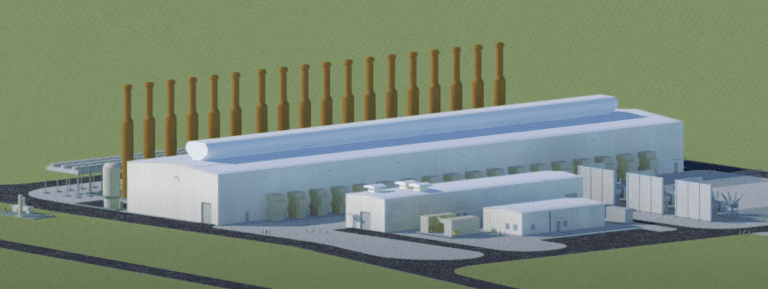A judge in Montana has canceled the air quality permit for a natural gas-fired power plant under construction in the state, citing concerns about emissions of greenhouse gases from the facility.
State District Judge Michael Moses on April 6 said government officials needed to more adequately consider the plant’s emissions during its lifecycle. The judge said the Yellowstone County Generating Station, being built by South Dakota-based NorthWestern Energy at an estimated cost of $283 million, could emit 23 million tons of GHG over its projected 30 years of operation.
Montana officials said state law did not give them authority to regulate GHG emissions from the 175-MW plant. A spokesperson for NorthWestern, in a statement issued April 7 and emailed to POWER, said the company would appeal the judge’s order. The statement said the gas-fired plant is needed to support a reliable supply of electricity in the region.
Air Permit Issued in 2021
NorthWestern in its statement said the group appreciated that Moses “supported the majority of the Montana Department of Environmental Quality’s [DEQ’s] air quality permit” that was issued to NorthWestern “after significant review and analysis for construction of the Yellowstone County Generating Station in a [2021] lawsuit by the Montana Environmental Information Center and the Sierra Club.”
Montana environmental officials issued the air quality permit on Sept. 8, 2021, which enabled NorthWestern to begin construction of the plant.

This is a rendering of the 175-MW Yellowstone County Generating Station, being built by NorthWestern Energy at a site along the Yellowstone River near Laurel, Montana. Source: NorthWestern Energy / YouTube
John Hines, NorthWestern’s vice president of Supply and Montana Government Affairs, who oversees the company’s environmental compliance and stewardship, in a statement said, “This ruling … appears to require new criteria to be analyzed, and jeopardizes reliable service for our Montana customers during critical times when customer energy demand is high, the coldest nights and the hottest days, typically times when renewable resources are generating little or no energy. Our air permit was reviewed and approved by the DEQ using standards that have been in effect for many years. We began construction of this project with this in mind. We will work with the DEQ to determine the path forward.”
There was no immediate comment from NorthWestern about whether construction of the plant would be halted.
“The Yellowstone County Generating Station natural gas plant is a critical part of a balanced and affordable portfolio that includes renewables and generation that is available on-demand, 24/7,” said Hines. “A balanced portfolio is essential to support the responsible transition to cleaner generation resources without compromising energy service reliability.”
Further Environmental Review
Moses in his ruling said DEQ officials had misinterpreted state law, and said they should conduct further review of the project’s environmental impact, including impacts related to climate change in Montana.
“This power plant is one of NorthWestern Energy’s largest projects in Montana and it is upwind of the largest city in Montana,” Moses wrote in his ruling. “It will dump nearly 770,000 tons of greenhouse gases per year into the air.”
Critics of continued fossil fuel-powered electricity generation in Montana, citing climate change, have noted that flooding on the Yellowstone River in June 2022 from heavy rain and snowmelt resulted in widespread damage and caused large parts of Yellowstone National Park to be evacuated. DEQ officials said they were reviewing the judge’s order.
The judge also said officials should have considered how lights at the power plant site could impact nearby property owners. The plant is located across the river from a residential neighborhood near the town of Laurel.
Montana lawmakers are considering legislation that would make it more difficult for individuals and organizations to sue the state regarding environmental decisions. The state Senate has passed a bill that requires anyone wanting to challenge an agency environmental review to have commented during the review process.
Groups or individuals suing a state agency in an environmental case also would have to pay for some of the agency’s court costs. The Senate action also would not allow nonprofit groups to use tax-deductible donations to pay for lawsuits against state agencies.
